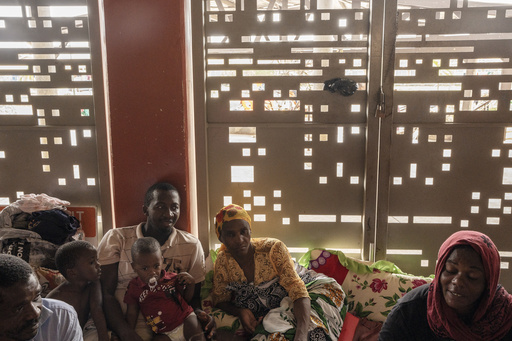MAMOUDZOU, Mayotte — French President Emmanuel Macron made a visit to the Indian Ocean island of Mayotte on Thursday to assess the damage caused by Cyclone Chido. Upon his arrival, he was met with stark realities and personal accounts of devastation from those affected by the disaster.
“Mayotte is destroyed,” expressed Assane Haloi, a security agent, grabbing Macron’s hand as he emerged from the plane. She detailed the dire conditions the islands have faced since Saturday when the cyclone, the worst to hit the region in nearly a century, relentlessly battered the French territory, situated off the coast of Africa. “We are without water, without electricity, and we have nowhere to go because everything has been destroyed,” Haloi lamented. “We can’t even find shelter; we are all soaked, attempting to cover ourselves and our children with whatever we can to sleep through the night.”
Authorities in France have reported at least 31 fatalities and over 1,500 injuries, with more than 200 being critically wounded. However, there are grave concerns that the death toll could reach hundreds or even thousands. Macron’s visit coincided with the arrival of reporters from various media outlets who were able to provide firsthand accounts of the catastrophic effects felt by survivors following the cyclone’s passage, which produced winds exceeding 220 kph (136 mph) that stripped homes of roofs and walls, leaving many trapped inside their collapsing abodes.
In Kaweni, a shantytown on the outskirts of Mamoudzou, the treacherous winds left a disturbing scene of widespread ruin, turning hillside dwellings into mere fragments of metal, plastic, and debris, outlining where homes once stood. “We who remain here are still in shock, but God has allowed us to survive,” shared Nassirou Hamidouni as he sifted through the wreckage of his former residence. “We are filled with sorrow. It’s impossible to sleep amidst all the destruction.”
Macron surveyed the ruined landscape from a helicopter before visiting a local hospital where healthcare workers expressed their struggle to cope with the influx of patients. One emotional staff member described the fatigue that had set in among the medical team, pleading, “Help the hospital staff and the hospital overall; everyone is exhausted.” Macron placed a reassuring hand on her shoulder as she wiped her tears, promising that significant supplies of food, medical treatment, and additional personnel had arrived with him, alongside a naval ship delivering 180 tons of essential aid and equipment. Further assistance, including water and a field medical facility expected to be established by Friday, was also on the way.
However, the visit encountered tension when Macron was confronted by a local resident who criticized him for being disconnected from the struggles endured by those in Ouangani, who had reportedly gone six days without water or help. Macron explained that it had taken military forces four days to clear the roads and organize aid delivery. As their conversation escalated, the president told the man, “If you want to continue shouting for attention,” he would walk away if the man was not genuinely interested in an exchange.
The uncertainty surrounding the fate of missing loved ones has compounded the residents’ agony, particularly as local customs dictate prompt burials, leaving families grappling with unclaimed losses. “We are dealing with open-air mass graves,” stated Estelle Youssoufa, a representative from Mayotte in the French parliament, pointing out the absence of rescue efforts to recover the deceased. Macron acknowledged that the death toll has likely been underreported and assured that communication services would be restored soon to help families locate their missing members.
As France’s poorest region, Mayotte, with a population of about 320,000 alongside an estimated 100,000 migrants, has faced significant challenges. Once a French colony, it opted to remain part of France during a 1974 referendum while other nearby islands achieved independence. The cyclone caused widespread devastation, impacting communities that disregarded storm warnings, presuming the storm would not escalate to such extremes.
Evidence of the cyclone’s destructive path remained pervasive, with streets flooded with water and clothing hung out to dry on remnants of homes and along railings spanning a debris-filled stream in the Kaweni area. Long lines of vehicles gathered at a functioning gas station, while families took refuge in a school designated as a shelter for around 500 people. Women washed clothes in makeshift basins, while children played on the remnants of a large chessboard.
Alibouna Haithouna, a displaced mother, recounted the ordeal of losing a family member. “It was a tragedy. We lost my brother,” she said, explaining the complications faced in retrieving his body from the hospital due to administrative hurdles and additional costs. “We have no way to recover him.”


